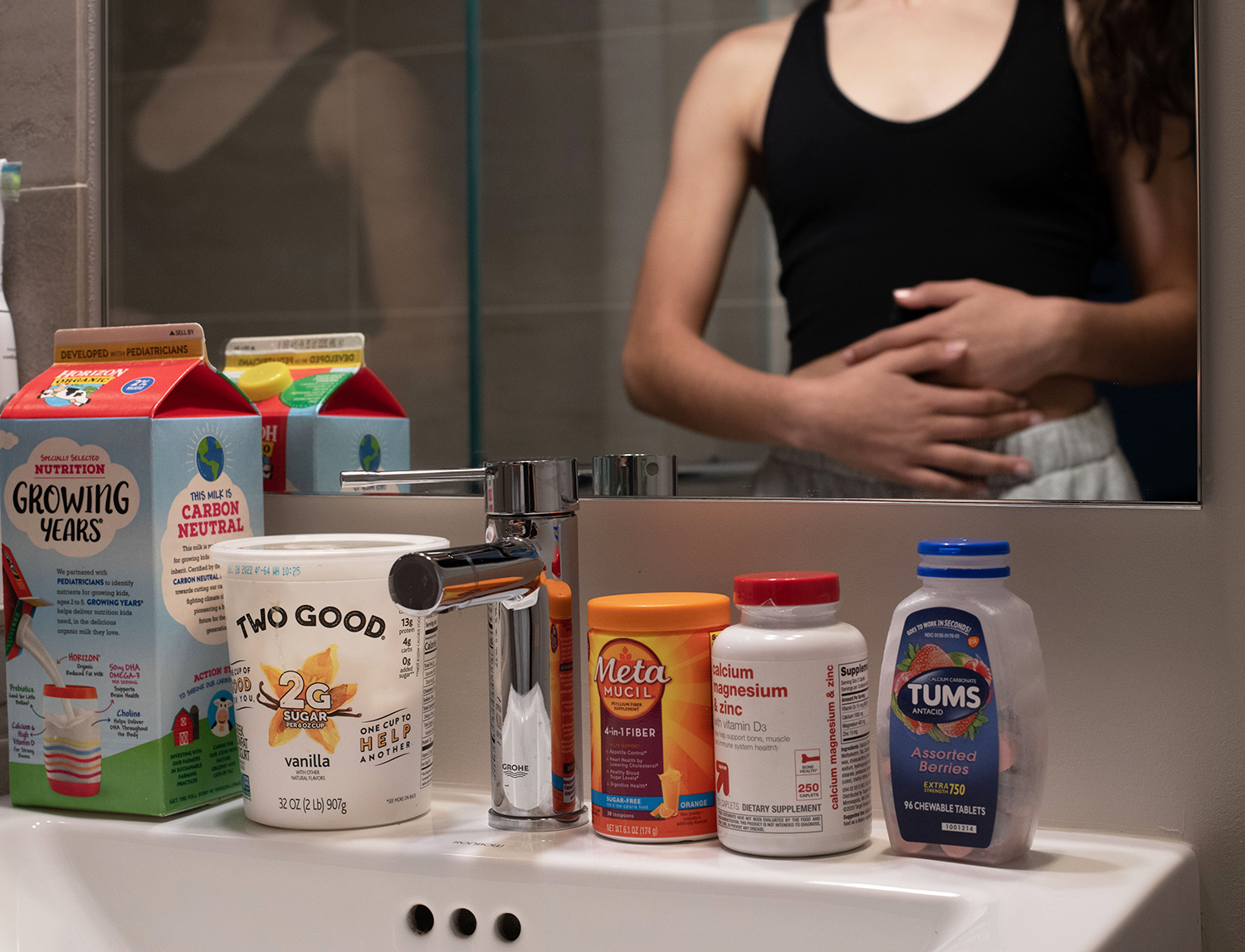
When gut intuition fails
January 17, 2023
Amy wakes up every morning just like the rest of us.
She wakes up to the sound of her alarm’s blaring noise—and is greeted by her lively dog and kitten. She cycles through her routine: brushing her teeth, good morning to her mom, eating breakfast.
But Amy isn’t leaving to hang out with her friends like the rest of us; she’s going to the hospital to get an infusion, just like she has every week since she was nine.
The Diagnosis
Growing up, Amy Rubinchik was just like everybody else from the outside—she went to school, hung out with her friends, and enjoyed spending time with her family. On the inside, she was anything but.
“As a child, I was always very underweight and I would get tired quicker than the other kids. I just remember all the other kids would be doing sports after school every day but I would just come home and feel super exhausted,” Rubinchik said. “It was really hard for me to gain weight. I was always an off-the-charts unhealthy weight.”
It wasn’t until the symptoms became abnormally consistent that her parents finally decided to take her to the doctor’s office to figure out what was wrong.
“They diagnosed me with something called ulcerative colitis, which is the inflammation of one of your intestines,” Rubinchik said.
According to Dr. Matthew Ciorba, a professor of medicine and director of inflammatory bowel disease (IBD) research at Washington University in St. Louis, those with inflammatory diseases have more vulnerable guts.
“When you have gastroenteritis or if somebody has Crohn’s disease or ulcerative colitis, basically, there’s a breakdown of the gut barrier and additional toxins and even some bacteria can get through that lining of the gut and cause more systemic related symptoms, such as depression and exhaustion,” Ciorba said.
Rubinchik’s family thought the problem was solved. Though the news itself wasn’t what they wanted to hear, it was a diagnosis—a feeling of closure and purpose. Even better, colitis had readily available medication which Rubinchik could take to overcome her intestinal inflammation. She could finally overcome her fatigue and severely low body weight.
“The medication was helping a little bit, but I still wasn’t able to do sports after school and do sleepovers and this or that because I was just always so exhausted. It was hard for me to do that and gain weight,” Rubinchik said. “I was definitely better than I was when I was younger, but I still wasn’t that good.”
A few years later, unhappy with the results of the first medication and eager to find a more effective one, Rubinchik and her family once again went to the doctor’s office. This time, the doctors took a different approach.
“I swallowed a pill that doubled as a camera. Then it took 1000 pictures of my insides to see if the doctors could figure out what was wrong. By then they figured out that I had Crohn’s, so third grade was when I officially was diagnosed with Crohn’s,” Rubinchik said.
According to Mayo Clinic, Crohn’s disease is an inflammatory bowel disease (IBD) that causes digestive swelling and inflammation.
It is rare in the United States, with fewer than 200,000 cases per year. Symptoms vary, with the predominant ones being abdominal pain, nausea, extreme weight loss, exhaustion, and constipation.
Following her diagnosis, Rubinchik was abruptly taken off her colitis medication and instead put on another medication called Remicade. Given through infusions, Remicade blocks TNA-alpha, a protein in our immune system that can cause inflammation in people with Crohn’s and colitis.
From her Crohn’s diagnosis at age nine up until sixth grade, Remicade turned Rubinchik’s life around for the better.
“It was really good. It definitely made me feel awesome for a long time,” Rubinchik said.
Resistance to Remicade
Although for a long time Remicade had lowered the Crohn’s symptoms that disrupted Rubinchik’s life, things began to shift in sixth grade.
Symptoms that had long been prevented by the medication began to arise, including some new, far more serious ones as well.
Symptoms like these occur when the body stops responding to therapy. Oftentimes, unpredictably, one’s body begins to reject long-used medication, enforcing doctors to intervene and prescribe a new medication.
“The only issue with the medicines for Crohn’s is that there are very few of them. There are only like, maybe eight or something different medications, so eventually what happens is that at some point your body rejects the medication, and then you can’t take it anymore. Your body begins to grow a resistance, or you start to get bad side effects from the medication—so bad, you have to stop and switch to another medication,” Rubinchik said.
It’s not uncommon for Crohn’s medication to eventually lose its effectiveness, and that’s exactly what happened to Rubinchik.
“I was feeling good, but then in sixth grade, I started to get seizures from the medicine and I was like ‘Okay, I have to get off the medicine because the side effects aren’t worth it if I keep getting seizures,’” Rubinchik said.
The decision to choose a medication for Crohn’s isn’t an easy one—all come with varying side effects and symptoms. Before choosing a new one to switch over to, Rubinchik was on no medication, leading her to the most unhealthy and vulnerable state she’d been in since being diagnosed.
“If I got sick, there was nothing protecting me. So I would just get really sick, which is when they decided to put me on Entyvio, but it took over six months for me to get used to it. I struggled to gain weight—I think I was 50 or 60 pounds at 13 years old, which is what a seven-year-old should weigh,” Rubinchik said.
In general, the gut is a key source of immunity throughout our body.
“The gut is the foundation of our overall health,” said Kelsey Russell-Murray. Russell-Murray is a clinical dietitian at St. Thomas Elgin General Hospital in Ontario, Canada, and owner of Gut Healthy Dietitian. “Over 70% of our immune system is actually contained within our GI tract, and we know that those healthy gut bacteria have a role in hormone production and vitamin synthesis. Overall digestive health can then translate over to better immunity in fighting diseases such as COVID-19.”
Rubinchik’s struggle to gain weight was primarily tied to the fact that her body rejected any food or drink she tried to eat.
“My mom and I went to the ER to try to get fluids because it was really hard for me to drink water and I was very dehydrated and malnourished. When I went to the ER and they gave me some water they just admitted me into the hospital then because they were like ‘Yeah, you’re very sick,’” Rubinchik said.
Though it took nine feeding tubes and transitioning to a wheelchair, Rubinchik’s body was finally able to react well to the Entyvio. Since leaving the hospital, she has felt physically and mentally better than ever before, only having to go in once a month for an infusion.
“I don’t really have any Crohn’s symptoms, which is awesome. I’m able to attend school every day. I do activities after school. I go out on the weekends and I have energy. I’m a normal weight now,” Rubinchik said.
Road to recovery
Furthermore, Rubinchik attributes her recovery to a temporary strict diet during the period of transitioning her medication. Like many other Americans, she and her mom tirelessly researched ways to relieve symptoms, starting with what she was putting into her body.
“My doctors were telling me, ‘No, you need to gain weight; you can go eat McDonald’s every day, eat Taco Bell every day, eat wherever you want, eat pie for breakfast, just as long as you gain weight.’ They were more worried about me gaining weight, which is where my mom came in with a more holistic approach,” Rubinchik said.
Motivated by her ultimate goal to change her daughter’s health for the better, Laura Rubinchik, Rubinchik’s mother, did extensive research on veering away from Western medicinal approaches and instead a more natural approach based upon lifestyle changes.
“She was like my angel; she helped me so much. We watched tons of documentaries about things like, you know, becoming vegan and how it helps with inflammation. And it really did help,” Amy Rubinchik said.
For a long period of time, she focused on promoting her gut health.
“I went vegan for like six months. I went full vegan and I also went dairy-free, gluten-free, and sugar-free. Basically, just by eating beans and quinoa and really healthy vegan things, my physical health improved so much,” Amy Rubinchik said.
Ciorba maintains that simple diet changes can have lasting effects on our gut health.
“A diverse diet, a diet rich in natural foods, and eating vegetables that have fiber; all those things can improve gut health,” Ciorba said.
Rubinchik’s intricate diet based on whole foods like lentils and quinoa is not only pertinent to her. In fact, Russell-Murray says eating whole foods is one of the best things you can do for your body and gut health.
“A high fiber diet is going to get you further in terms of gut health than any other supplement and not just a high fiber diet, but in a wide variety of different plant foods because all different types of plant foods have different types of fiber and they feed different types of gut bacteria,” Russell-Murray said.
Rubinchik and her mother weren’t alone in their diet quest. According to a study by Food Insight, 39% of respondents adhered to a diet to improve their gut health in 2022, and 24% of all respondents said improving their gut health was their main health priority. Though not as severe as Rubinchik’s case, Americans have increasingly made strides to improve digestive health.
In addition to the increase in “gut healthy” diets, Americans have bought into prebiotics and probiotics. The probiotic industry was worth $48.9 billion in 2019; probiotics are estimated to be worth $94.9 billion by 2027 according to a study by Fortune Business Insights.
“Prebiotic is just a fancy word for the type of fibers that are healthy gut bacteria,” Russell-Murray said.
To add, Ciorba believes the market is taking advantage of consumers by pushing the overarching label of a probiotic.
“Companies have just selected this phrase in general, “have been known to be beneficial,” when the product is essentially cultured or fermented milk, and then they put them in a product and they call it a probiotic,” Ciorba said.
While the composition of probiotics is fairly simple, they can still make a difference in people’s health. However, people are often led to independently purchase them and self-diagnose, rather than consult a professional to target their specific needs.
“They can be beneficial absolutely in certain circumstances. But it’s not a ‘take any strain and expect it to fix your particular health problem’ kind of situation,” Russell-Murray said. “ I really caution people with probiotics because I think they can be really great and useful but you have to be taking the right one for what you want to target.”
Overall, Russell-Murray believes that people are led to believe that we are more affected by gut health than we really are. As research evolves, gut health is becoming more of a centralized issue in the health world; however, most of the population’s gut health isn’t as affected as the health industry often makes it out to be.
Both Russell-Murray and Ciorba assert that above all, the best thing to do to promote general gut health is to follow a healthy diet.
“We know that exposure to processed foods and lots of preservatives and chemicals and artificial sweeteners and things like additives in food are not good for our gut health, so prioritizing a diverse, high-fiber and unprocessed diet is the best thing we can do,” Russell-Murray said.



